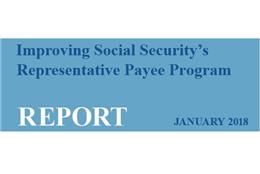Improving Social Security’s Representative Payee Program
 More than two years ago, the Social Security Advisory Board (board) committed itself to exploring how to strengthen the representative payee (rep payee) program of the Social Security Administration (SSA), which serves approximately eight million vulnerable beneficiaries/recipients. This paper summarizes the board’s recommendations for both immediate changes by SSA and a plan for broader government-wide action. The board found broad interest in improving SSA’s rep payee program and reached bipartisan agreement on how to do so.
More than two years ago, the Social Security Advisory Board (board) committed itself to exploring how to strengthen the representative payee (rep payee) program of the Social Security Administration (SSA), which serves approximately eight million vulnerable beneficiaries/recipients. This paper summarizes the board’s recommendations for both immediate changes by SSA and a plan for broader government-wide action. The board found broad interest in improving SSA’s rep payee program and reached bipartisan agreement on how to do so.
The report provides short-term recommendations to SSA and Congress which the board believes will strengthen the current administrative process and create a more manageable monitoring role. The board also advocates for the Office of Management and Budget to pursue long-term structural changes which will involve comprehensive government-wide coordination efforts and cross-agency reforms.
This report is organized into five parts. Part I highlights the size and expected growth of SSA’s rep payee program. Part II examines the processes for determining the need for and the selection of rep payees. Part III provides an overview of SSA’s program monitoring. Part IV discusses the need for inter-agency collaboration. Part V lists all the board’s recommendations discussed and contained within each of the aforementioned sections. The appendices of the report provide a brief history of the rep payee program, a summary of the National Academies study on financial capability, an overview of the board’s work on rep payee issues and of the board’s 2017 forum on rep payees, and a description of an online chart collection that accompanies the report.
Explore the board’s report below:
This report extends the board’s recent work on rep payee issues. In March 2017, the board hosted a public forum on the rep payee program to engage stakeholders of different perspectives and professions. The board’s 2016 issue brief, Representative Payees: A Call to Action, outlined key issues facing the program to generate public awareness and congressional commitment. The board has also recently examined the supported decision-making movement in its 2016 annual statement on the Supplemental Security Income program; in its 2014 annual statement, the board examined issues regarding rep payees of foster children.